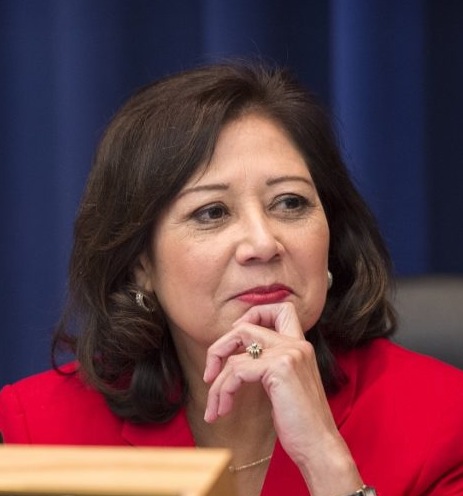Wave Wire Services
LOS ANGELES — Responding to a RAND Corp. report finding that deputy cliques accused of gang-like behavior still exist with the sheriff’s department, the Board of Supervisors asked the Civilian Oversight Commission to develop a plan to eradicate the groups.
Supervisors Hilda Solis and Holly Mitchell co-authored the motion Sept. 28, which was not part of the planned agenda and was read in toward the end of the meeting.
Solis noted that the study by the Santa Monica-based think tank, commissioned in 2019 and released last month, found that a majority of deputies still believe the subgroups are a positive force in the department and only 37% support banning them altogether.
“The RAND study confirmed what we’ve known for many years, that deputy gangs exist, even if the sheriff says there are not any or tries to minimize their existence,” Solis said. “Those that know best are the residents of our county, especially those families who have suffered at the hands of deputy misconduct.
“There shouldn’t be a need for these actions, but unfortunately we have no choice when deputy gang members continue to engage in harm, intimidation and harassment.”
Sheriff Alex Villanueva blasted the RAND Corp. report, insisting that his administration has cracked down on such groups.
“With all the negative press associated with the deputy subgroups, with the efforts that I’ve done, my administration has done — putting in the policy, enforcing the policy, creating a video that every single member of the department had to see, they had to sign an attestation form, … none of this was mentioned in the RAND study,” Villanueva said.
RAND researchers concluded that department leadership can best discourage involvement in deputy subgroups — a neutral term adopted by researchers — by clarifying policy language and delivering strong and consistent messages to its staff.
Villanueva said the RAND report essentially made 37 recommendations for addressing the issue of deputy cliques, and 30 of them are already in place. Department policy prohibits behavior that violates the rights of others.
Questioned about this claim, a RAND presenter said the sheriff’s policy amounts to a “first step” and more needs to be done to change the culture. That includes clear guidance for command staff — particularly captains — about expectations and appropriate responses for dealing with the secretive subgroups.
RAND researchers interviewed both civilians and department members, who offered starkly different views of these groups.
Civilians shared stories of harassment and intimidation.
“[I] watched [deputies] torment a girl whose son got killed by a ricochet bullet,” one resident told researchers. “They were outside in front doing doughnuts in their sheriff’s cars trying to intimidate us and make us leave.”
Another said the groups perpetrate an “us versus them” attitude.
“You have to be willing to do certain things — beat people up, use excessive force, shoot people. A lot of illegal things. It’s not like joining the Boy Scouts — if you’re celebrating people getting killed with tattoos, it’s out of hand,” another shared.
Some deputies agreed that these groups encourage hardened attitudes about the community. But others said they were the result of “a bond that occurs with people who face death together” and a way to know that others have your back while doing a dangerous job.
The RAND report found that “subgroups vary significantly. Some are drinking groups. Others are closer to cliques or, as one respondent called them, ‘popular kids.’ And some encourage a culture of aggressive policing.”
Responses received from deputies about the cliques ranged from “those who belong to a subgroup hold themselves and each other to a higher standard and are the best LASD has” to deputies who believed “they [subgroups] have destroyed many honest and hard-working deputies’ lives and careers.”
The names alone — which over the years have included the Banditos, Buffalo Soldiers, Cavemen, Cowboys, Executioners, Grim Reapers, Jump Out Boys, Little Red Devils, Pirates, Rattlesnakes and Wayside Whities — are enough to raise concerns.
Mitchell said it was “tragic” that the needs of deputies were ignored to the point that the way some chose to manage stress and feel safely supported by colleagues was to “join a group like the Jump Out Boys and the
Executioners.”
The board, RAND researchers and the sheriff agree on one thing: this problem has existed for decades, long before Villanueva was sworn in in 2018.
“It’s clear this is a systemic issue that costs lives, public trust and millions of dollars,” Mitchell said. “We must assess the recommendations within this study to make the necessary changes to end the culture that allows for these gangs to exist within our law enforcement.”
County counsel estimates that the county has spent $55 million to settle lawsuits related to deputy gangs since 1990.
“Every single one of my predecessors has kicked the can down the road saying they either didn’t exist or did nothing about it,” Villanueva said.
The board directed the Civilian Oversight Commission to work in consultation with the Office of Inspector General, County Counsel, the District Attorney’s Office, Office of the Public Defender, Office of the Alternate Public Defender, the Sheriff’s Department and members of the public to come up with a specific plan for implementation.
A RAND researcher told the board that any plan to eliminate such groups is likely to be divisive.
He also warned that “increasing scrutiny may make groups more secretive” and acknowledged the need for some form of camaraderie when deputies feel under attack by the public.
As with other board efforts to dictate what Villanueva may or may not do, this effort may run into the limits of the board’s authority in dealing with an elected official and potential legal challenges. The motion calls for the Civilian Oversight Commission to consider policies that the board itself could impose in the context of existing state and local laws.
A report is expected back in 90 days.











